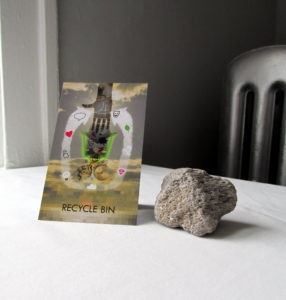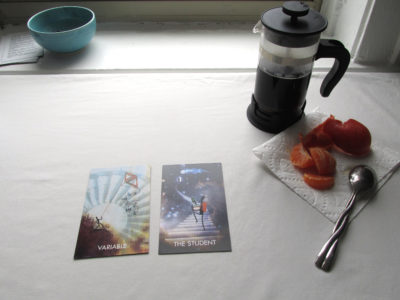Integrating Frames into your spiritual practice
Questions frequently come in about how to integrate Frames into the person’s existing spiritual or analytic practice. Here’s some suggestions —
Mindfulness and meditation

A sitting practice of mindfulness or meditation has been shown scientifically to reduce stress and increase awareness in your life. Whether you are an weekend sitter, or have a regular habit, Frames can be an interesting new component.
Mallory wrote in that they often have difficulty with quiet sitting meditation, and end up feeling guilty about it. Mallory found that by pulling one Frames card and bringing it with you to your sitting session, it acts as focal spot for your eyes. Sometimes Mallory selects a card out that fits the crazy week, such as Reset, to clear out leftover stress, or sometimes one is pulled at random and used to focus thought on a new idea. Normally, after the initial thoughts have settled down, Mallory will turn the card over and settle into breathing.
Journaling and Reflection
Karen writes that her Sunday morning routine includes some strong coffee, turning off electronic devices, and journaling about the week gone by. Her journals sometimes turned into a rant session, she found, and by pulling out one or two Frames cards and placing them near (but not in the way of the coffee!) she can write significantly deeper reflections. Sometimes, she shuffles and gets two cards at random, but other times she looks through them all and selects one or two that fit what she wants to write about. “The card details are so interesting,” she says, “and always give me new ways to reflect on issues in my journals.”

Ministry and community practice
Jeremiah is a youth leader at his local church and with the Boy Scouts in Denver. Having survived a tumultuous childhood and spent 20 years searching for his own purpose with drugs, alcohol, and under-employment, Jeremiah emerged with a son of his own. He became committed to stopping that cycle in his community. When he came across Frames, he was interested in using it as a prompt for conversations with some really tough kids. “It’s so hard to strike up a meaningful conversation with some of these kids,” he says. “They avoid anything resembling emotional pain and just turn away from it. But they do want to talk.” So he let one withdrawn kid at his church shuffle and pull out one card. It was Sensor. Jeremiah laid it on the table and asked the boy to tell a story about it, maybe how it was like himself. Having the tree and the sensor illustration was a neutral way to deflect that embarrassing eye contact and too much reveal at once. He kept the session short. They eventually started to have a rapport and trust. “Nothing changes overnight,” says Jeremiah, “you’re a fool if you think it does. But every so often, over time, you can see something change. And that’s enough to get started.”
